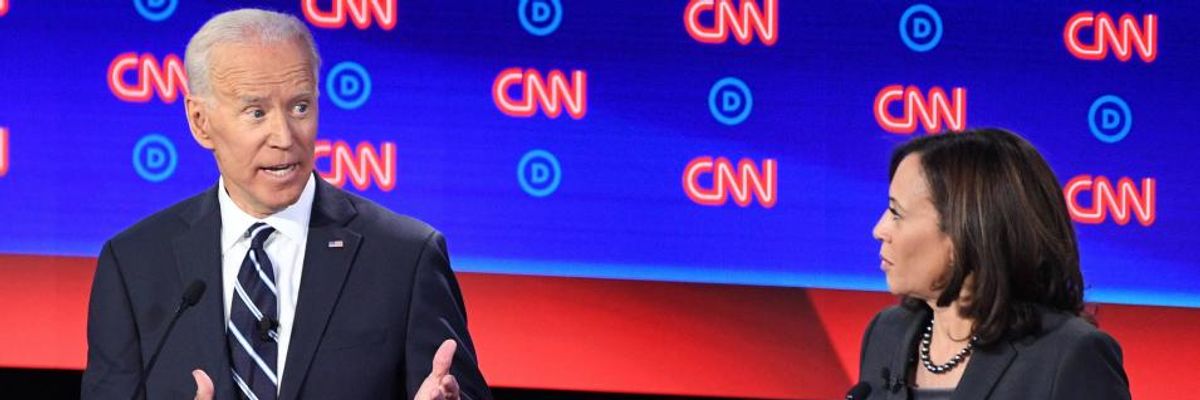Former Vice President Joe Biden and Sen. Kamala Harris inadvertently highlighted one of the key virtues of Medicare for All with their jumbled, vague, and at times dishonest healthcare discussion during Wednesday night's Democratic presidential primary debate.
That was a major takeaway of progressives and health policy experts, who said Harris and Biden's difficulty in explaining the details and benefits their respective proposals showed by comparison the simplicity--and, single-payer proponents argued, the superiority--of Medicare for All in both messaging and policy.
"Without Bernie Sanders or Elizabeth Warren there to make a real case for Medicare for All, the debate meanders."
--Libby Watson, Splinter
"This flailing discussion is a good demonstration of why Medicare for All makes for great messaging," tweetedThe Week's Ryan Cooper. "All these complicated-ass half-measures are impossible to explain."
Biden and Harris released their healthcare proposals in the days leading up to the second Democratic presidential debate, and both were criticized as inadequate to the task of overhauling America's deadly, profit-driven status quo.
The former vice president's plan would create a public option and expand Affordable Care Act subsidies. Harris's proposal, which she misleadingly described as "Medicare for All," would expand Medicare and preserve a major role for private insurance.
Analysts said the inadequacies of both plans were on display on the debate stage Wednesday night, just 24 hours after Sens. Bernie Sanders (I-Vt.) and Elizabeth Warren (D-Mass.) forcefully defended Medicare for All from attacks by right-wing Democratic candidates.
"For all its other pros and cons, single-payer's not-so-secret weapon is its simplicity," tweeted the Washington Post's Jeff Stein. "So clear and easy to explain: Everybody in; nobody out; no healthcare costs."
By contrast, Stein pointed to Biden's explanation of his plan, which--by his campaign's own admission--would leave millions of Americans uninsured.
"They can buy into this plan," Biden said of Americans who currently have employer-sponsored insurance. "And they can buy into it with a $1,000 deductible and never have to pay more than 8.5 percent of their income when they do it."
Biden went on to bash Medicare for All in a way that showed, as Splinter's Libby Watson put it, he "does not have a good grip on how healthcare works."
"The fact of the matter is that there will be a deductible," Biden said of Medicare for All, which would in fact eliminate premiums, co-pays, and deductibles. "It will be a deductible on their paycheck. Bernie acknowledges it. Bernie acknowledges it. Thirty trillion dollars has to ultimately be paid... I tell ya, that's a lot of money, and there will be a deductible. The deductible will be out of your paycheck, because that's what will be required."
As Watson noted, "Biden seemed very confused about basic questions of health insurance."
"He initially claimed his plan would limit co-pays to $1,000, then corrected himself later to say there would be $1,000 deductibles--but then said that Sanders' plan has 'a deductible in the paycheck.' This, for a start, is not a thing--a deductible is the amount of money you have to spend on healthcare before the insurance company will chip in, not something that comes out of your paycheck.
"Presumably, he means a premium, but that's not true, either," Watson added. "Sanders's plan has no premiums."
David Sirota, Sanders's speechwriter, said Biden's plan would still leave families with large healthcare bills:
Harris, for her part, was accused of "appropriating" Medicare for All as a mere "brand" while advocating a plan that the lead House sponsor of the Medicare for All Act of 2019 said is decidedly not Medicare for All.
"The reality is that our plan will bring healthcare to all Americans under a Medicare for All system," Harris said, remaining vague about the significant role carved out for private insurers under her proposal.
The California Democrat said she crafted her plan after "listening to American families, listening to experts, listening to healthcare providers."
"I listened to the American families who said four years is just not enough to transition into this new plan," Harris said, referring to the transition period proposed by Sanders's legislation, "so I devised a plan where it's going to be 10 years of a transition. I listened to American families who said I want an option that will be under your Medicare system that allows a private plan."
Larry Levitt, a health policy expert at the Kaiser Family Foundation, told the Washington Post after Wednesday night's debate that, "A pure Medicare for All plan is much easier to describe than these complicated plans that try to thread the political needle."
According to Watson, the debate provided clear evidence that "[n]o one up there gives a shit about whether Medicare for All happens."
"Without Bernie Sanders or Elizabeth Warren there to make a real case for Medicare for All, the debate meanders," Watson wrote. "Since her mix-up on private insurance earlier this year, I've thought that the most likely outcome under a President Kamala Harris would be her getting into office and ending up supporting a public option at best. Tonight's discussion did nothing to dispel that."
Joe Sanburg, advisory board member with Business for Medicare for All, said in a statement Wednesday night that the United States needs "a true Medicare for All system--not something that sounds like it, but really relies on private health insurance companies."
"A plan that would not remove health insurers, the middle men, from our healthcare payment system is not the answer," said Sanburg.
